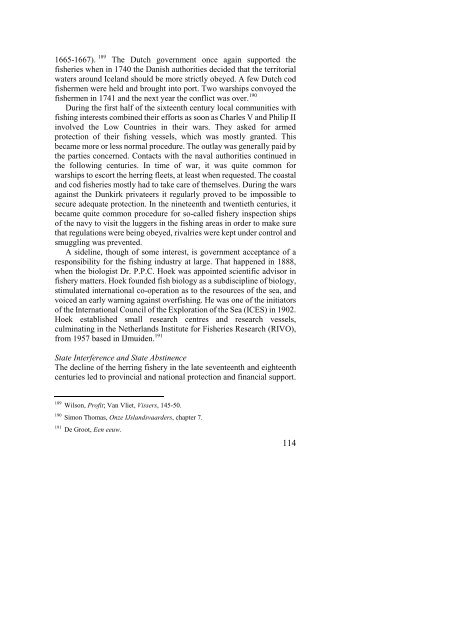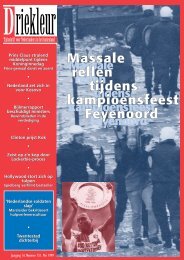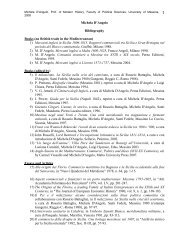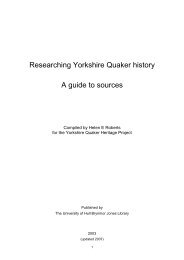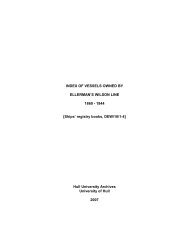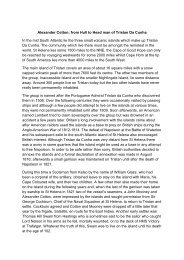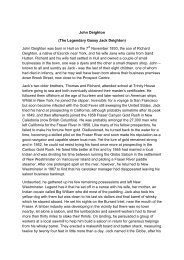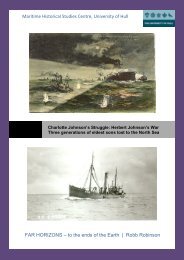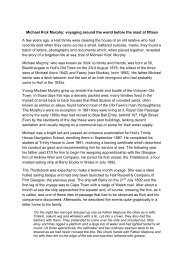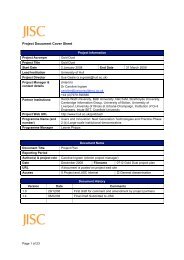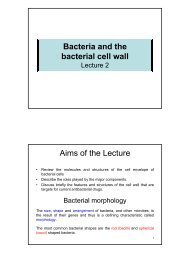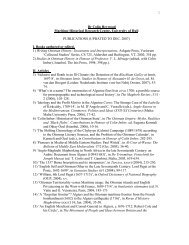The North Atlantic Fisheries, 1100-1976 - University of Hull
The North Atlantic Fisheries, 1100-1976 - University of Hull
The North Atlantic Fisheries, 1100-1976 - University of Hull
You also want an ePaper? Increase the reach of your titles
YUMPU automatically turns print PDFs into web optimized ePapers that Google loves.
1665-1667). 189 <strong>The</strong> Dutch government once again supported the<br />
fisheries when in 1740 the Danish authorities decided that the territorial<br />
waters around Iceland should be more strictly obeyed. A few Dutch cod<br />
fishermen were held and brought into port. Two warships convoyed the<br />
fishermen in 1741 and the next year the conflict was over. 190<br />
During the first half <strong>of</strong> the sixteenth century local communities with<br />
fishing interests combined their efforts as soon as Charles V and Philip II<br />
involved the Low Countries in their wars. <strong>The</strong>y asked for armed<br />
protection <strong>of</strong> their fishing vessels, which was mostly granted. This<br />
became more or less normal procedure. <strong>The</strong> outlay was generally paid by<br />
the parties concerned. Contacts with the naval authorities continued in<br />
the following centuries. In time <strong>of</strong> war, it was quite common for<br />
warships to escort the herring fleets, at least when requested. <strong>The</strong> coastal<br />
and cod fisheries mostly had to take care <strong>of</strong> themselves. During the wars<br />
against the Dunkirk privateers it regularly proved to be impossible to<br />
secure adequate protection. In the nineteenth and twentieth centuries, it<br />
became quite common procedure for so-called fishery inspection ships<br />
<strong>of</strong> the navy to visit the luggers in the fishing areas in order to make sure<br />
that regulations were being obeyed, rivalries were kept under control and<br />
smuggling was prevented.<br />
A sideline, though <strong>of</strong> some interest, is government acceptance <strong>of</strong> a<br />
responsibility for the fishing industry at large. That happened in 1888,<br />
when the biologist Dr. P.P.C. Hoek was appointed scientific advisor in<br />
fishery matters. Hoek founded fish biology as a subdiscipline <strong>of</strong> biology,<br />
stimulated international co-operation as to the resources <strong>of</strong> the sea, and<br />
voiced an early warning against overfishing. He was one <strong>of</strong> the initiators<br />
<strong>of</strong> the International Council <strong>of</strong> the Exploration <strong>of</strong> the Sea (ICES) in 1902.<br />
Hoek established small research centres and research vessels,<br />
culminating in the Netherlands Institute for <strong>Fisheries</strong> Research (RIVO),<br />
from 1957 based in IJmuiden. 191<br />
State Interference and State Abstinence<br />
<strong>The</strong> decline <strong>of</strong> the herring fishery in the late seventeenth and eighteenth<br />
centuries led to provincial and national protection and financial support.<br />
189 Wilson, Pr<strong>of</strong>it; Van Vliet, Vissers, 145-50.<br />
190 Simon Thomas, Onze IJslandsvaarders, chapter 7.<br />
191 De Groot, Een eeuw.<br />
114


